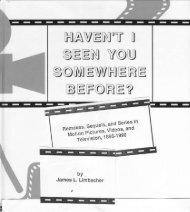DOWNLOAD Genocide in Our Time - NewFoundations
DOWNLOAD Genocide in Our Time - NewFoundations
DOWNLOAD Genocide in Our Time - NewFoundations
Create successful ePaper yourself
Turn your PDF publications into a flip-book with our unique Google optimized e-Paper software.
Chapter 5THE ARMENIANGENOCIDE:REVISIONISM AND DENIALby Rouben AdalianThe Turkish government has adopted three l<strong>in</strong>esof argument to conv<strong>in</strong>ce the world that noth<strong>in</strong>gout of the ord<strong>in</strong>ary happened to the Armeniansdur<strong>in</strong>g the years 1915-1923. Three theses havebeen advanced: the denial thesis; the revisionistthesis; and the justification thesis. The threetheses can <strong>in</strong> turn be divided among sixcategories of authors as follows: participants,apologists, rationalizers, revisionists,dis<strong>in</strong>formers, and distorters. In the years s<strong>in</strong>ce1923 several factors have contributed to theworld's acquiescence <strong>in</strong> the Turkish program ofdenial and revisionism. First, Turkey becamerespectable as the Turkish Republic underKemal Attaturk; second, Turkey jo<strong>in</strong>ed theUnited Nations as a charter member <strong>in</strong> 1945;and third, Turkey jo<strong>in</strong>ed the North AtlanticTreaty Organization <strong>in</strong> 1952.In the unfold<strong>in</strong>g process of genocide, denial is thef<strong>in</strong>al stage. There was little doubt at the end of WorldWar I that the Young Turk government had implementedmeasures which resulted <strong>in</strong> the decimation of theArmenian population <strong>in</strong> the Ottoman Empire. Yet twoyears later, the effort to rehabilitate the survivors wasabandoned. Three years after that, the question ofresponsibility was entirely forgotten. S<strong>in</strong>ce then, thegovernment of Turkey has found it convenient to denythat anyth<strong>in</strong>g out of the ord<strong>in</strong>ary happened to theArmenians.The coverup of the Armenian genocide was notthe work of the Turkish government alone. The courseof political developments <strong>in</strong> the decades follow<strong>in</strong>gWorld War I furnished a favorable environment forignor<strong>in</strong>g the consequences of genocide. The silence ofthe <strong>in</strong>ternational community emboldened the Turkishgovernment to make the denial of the Armeniangenocide a state policy. Only the matter of legitimiz<strong>in</strong>gthe official view on the non-occurrence of the eventrema<strong>in</strong>ed.Post-War UnsettlementThe rapid changes <strong>in</strong> government that took placeafter World War I, <strong>in</strong>clud<strong>in</strong>g the shift of power fromIstanbul to Ankara and the emergence of new leaders,hopelessly complicated the effort for a serious deliberationon the Armenian genocide. Defeated <strong>in</strong> war, theYoung Turk cab<strong>in</strong>et resigned <strong>in</strong> 1918. The Committeeof Union and Progress (CUP), which led the YoungTurk movement, disbanded. The adm<strong>in</strong>istration of whatThe Armenian <strong>Genocide</strong>: Revisionism and Denial 85



